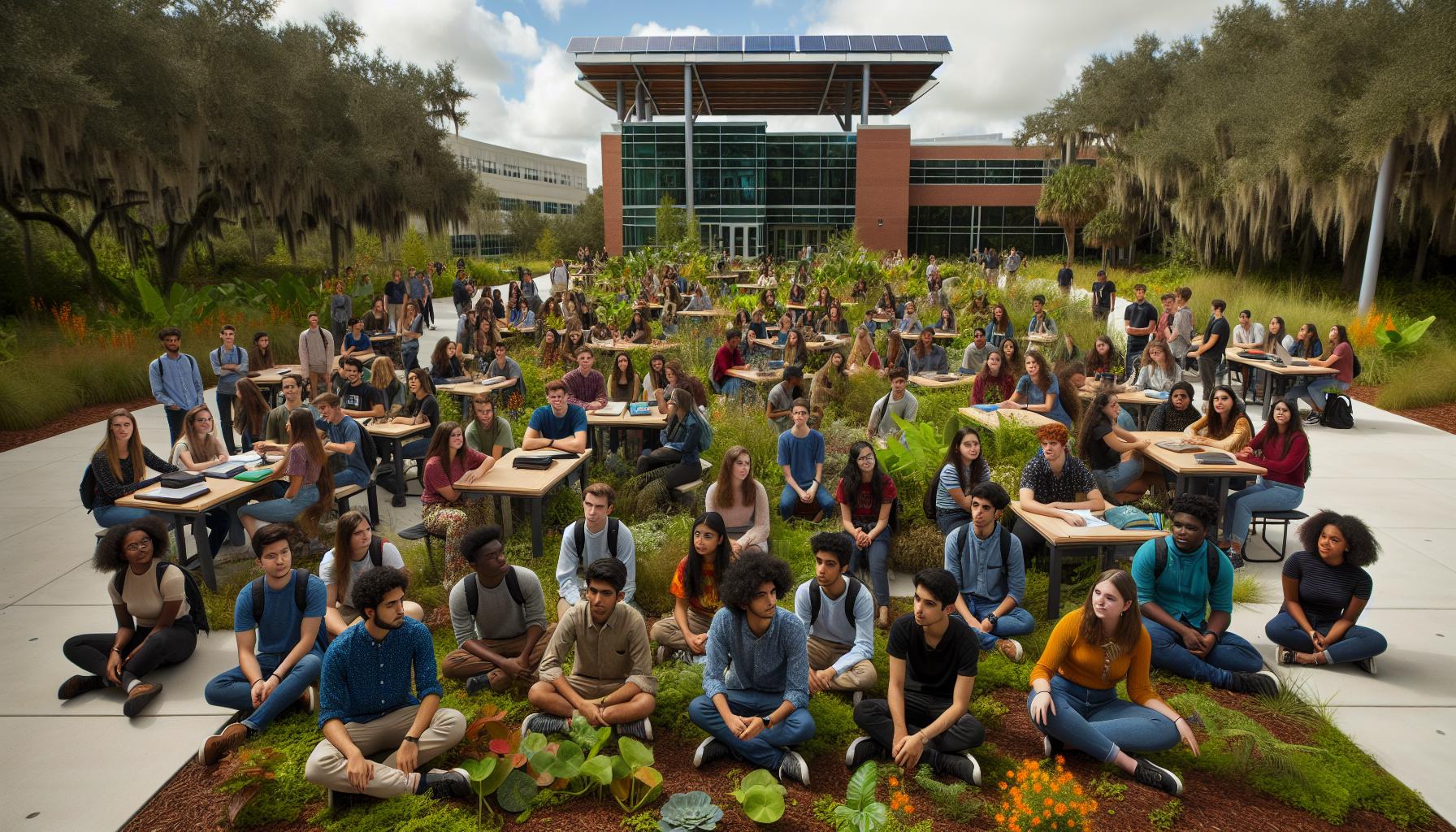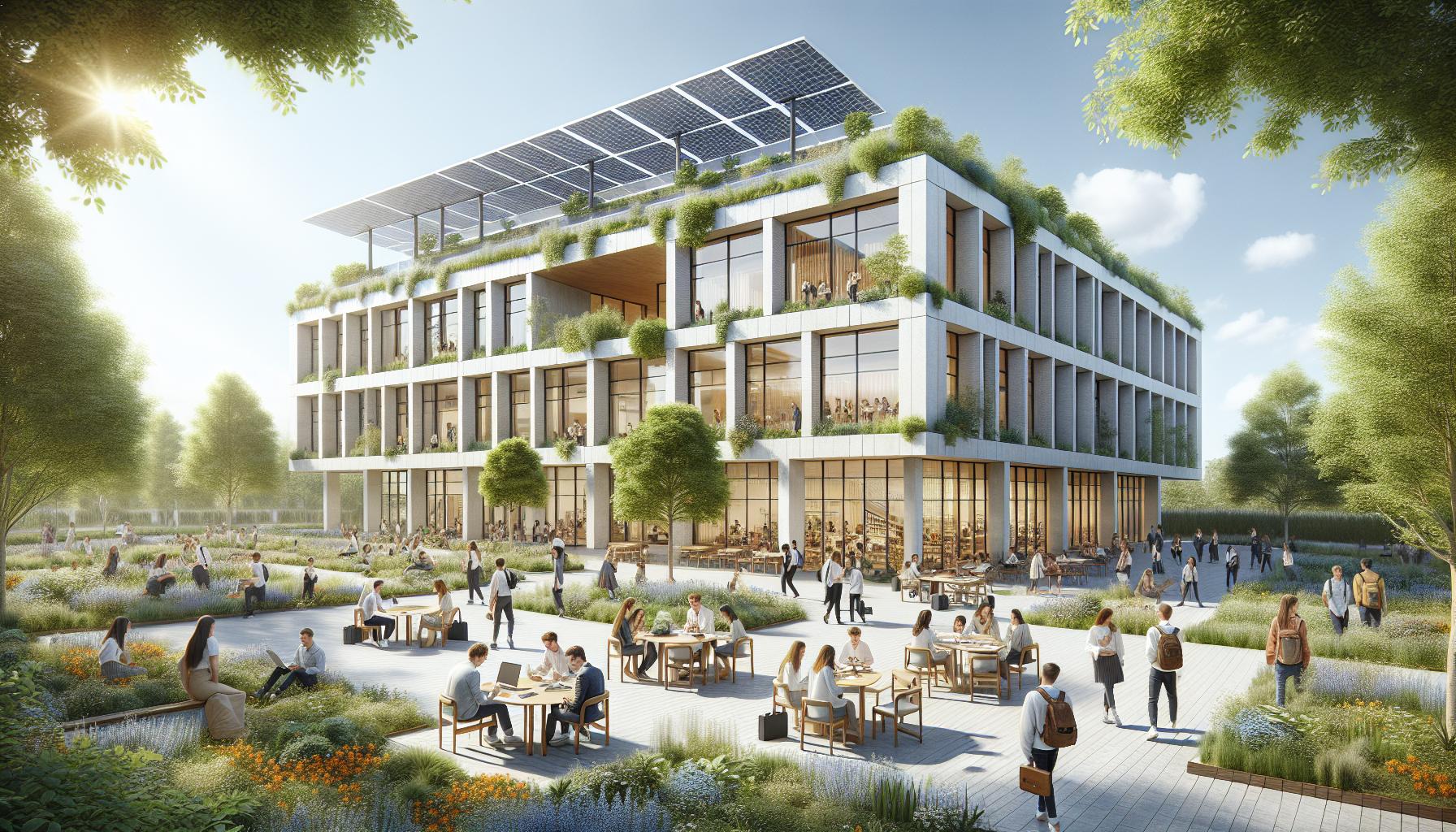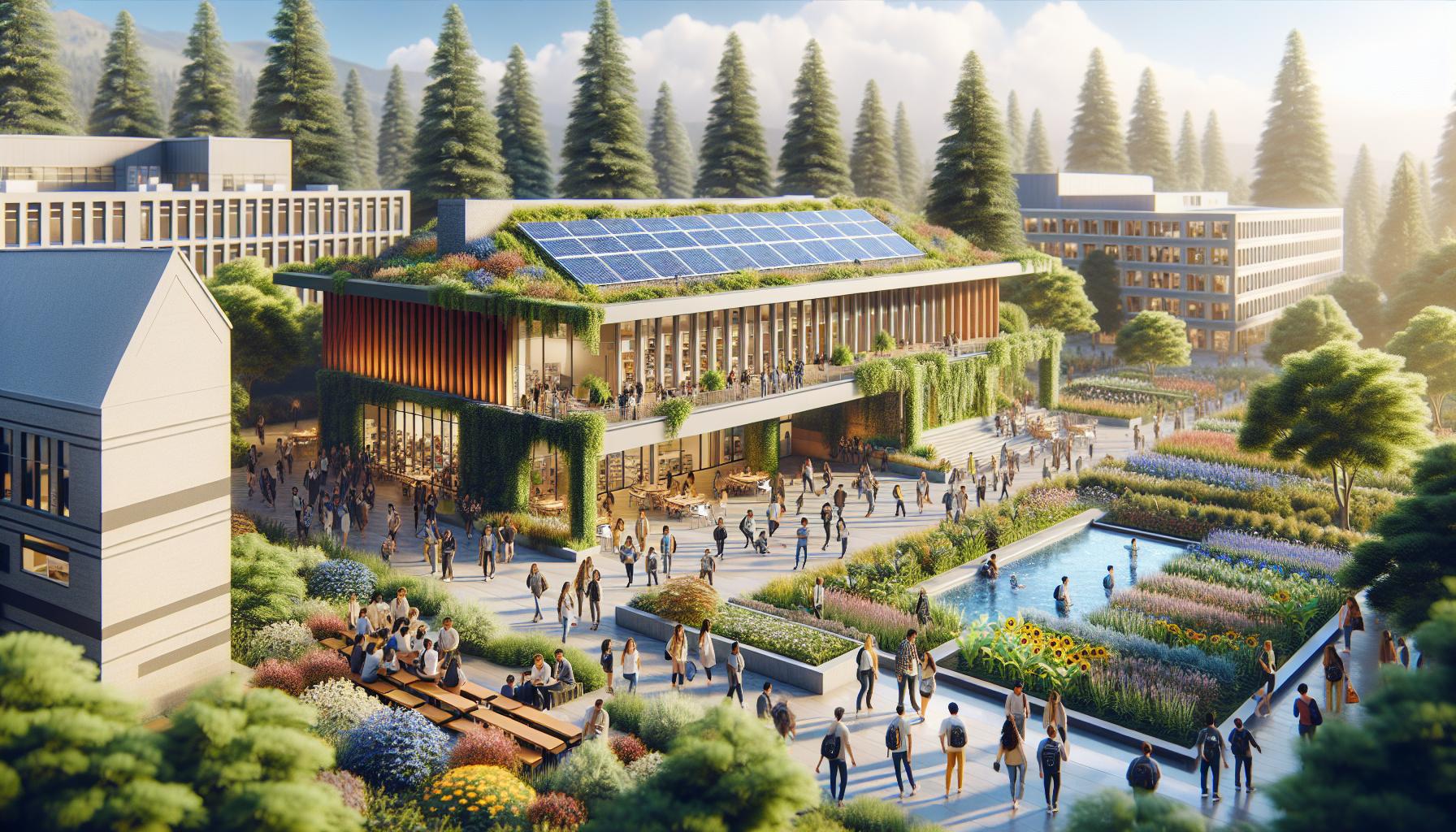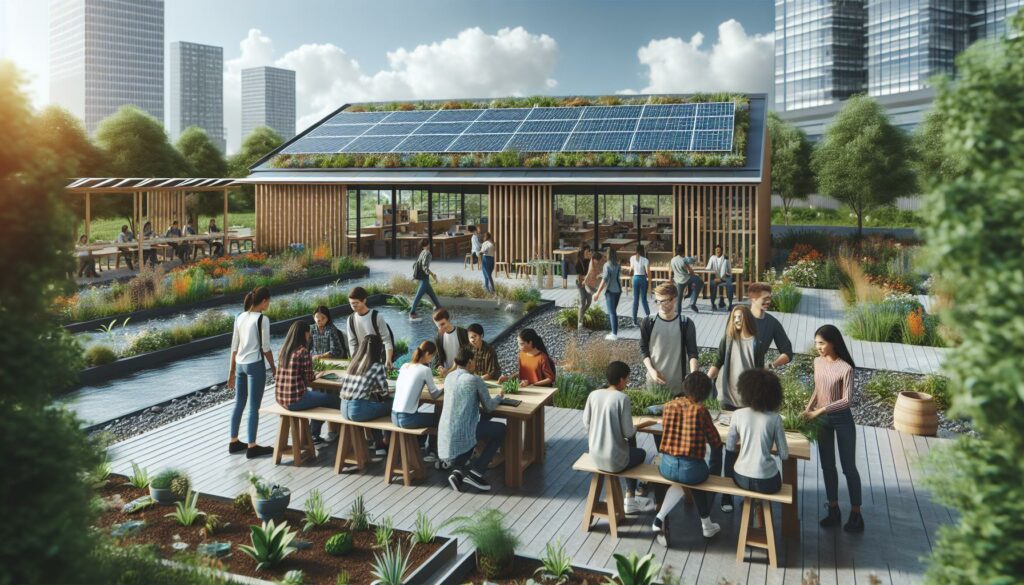In a world where the phrase “going green” has become as trendy as avocado toast, the University of Florida stands at the forefront of sustainability in the built environment. Imagine a campus where buildings not only house students but also harmonize with nature, saving energy while keeping the gators happy. It’s not just a dream; it’s a reality that’s taking shape, one eco-friendly brick at a time.
As UF dives into sustainable practices, they’re not just checking off boxes on a green checklist. They’re creating innovative spaces that inspire a healthier planet. From energy-efficient designs to smart water management, UF is proving that sustainability can be both practical and downright exciting. So, buckle up as we explore how UF is transforming the built environment into a model of sustainability that even Mother Nature would applaud.
UF Sustainability and the Built Environment
The University of Florida prioritizes sustainability through its built environment initiatives. Eco-friendly practices play a crucial role in campus projects, ensuring that new buildings and renovations meet high sustainability standards. Energy efficiency stands at the forefront of UF’s strategy, where innovative designs and materials contribute to reduced energy consumption.
UF’s commitment includes incorporating renewable energy sources. Solar panels installed on various buildings reflect the university’s dedication to harnessing clean energy. Additionally, rainwater harvesting systems promote water conservation, aligning with the overall goal of minimizing the environmental impact.
Landscape design also supports sustainability efforts. Native plant species are favored over non-native varieties, enhancing biodiversity while reducing irrigation needs. Green spaces throughout the campus encourage outdoor activity, promoting well-being among students and staff alike.
Collaboration among departments fosters a culture of sustainability at UF. Academic programs integrate environmental studies into curricula, raising awareness about sustainable practices. Events and workshops engage the university community, encouraging participation in sustainability initiatives.
Tracking progress plays a vital role in UF’s sustainability journey. The university monitors energy usage and carbon emissions, employing this data to assess goals and enhance strategies. Continuous improvement underscores UF’s proactive approach to sustainability, ensuring that its commitment evolves with emerging best practices.
Overall, UF sets a benchmark in how higher education institutions can synergize sustainability and the built environment. Its holistic approach addresses environmental challenges while enhancing campus life, demonstrating leadership in promoting a sustainable future.
Key Principles of Sustainability

Sustainability at the University of Florida relies on three key principles: environmental impact, social equity, and economic viability. Each principle plays a crucial role in creating a resilient built environment.
Environmental Impact
Minimizing the carbon footprint represents a priority for UF. The use of renewable energy sources, like solar panels, greatly contributes to this goal. Implementing rainwater harvesting systems enhances water conservation on campus. Promoting native plants in landscape design not only supports biodiversity but also reduces irrigation needs. Green spaces on campus foster outdoor activities while benefiting overall well-being. Tracking energy usage and carbon emissions allows UF to assess progress and refine strategies regularly.
Social Equity
Creating accessible spaces for everyone remains an essential aspect of UF’s approach. Inclusive design in campus buildings ensures that all individuals, regardless of ability, can navigate effectively. Engaging the community through workshops promotes awareness of sustainability practices. The inclusion of diverse voices in sustainability initiatives guarantees equitable outcomes. Active participation in sustainability projects strengthens relationships among students, faculty, and local residents. Building a diverse community enriches the overall impact of sustainability efforts.
Economic Viability
Achieving cost-effective sustainability solutions is vital for UF’s long-term planning. Investing in energy-efficient technologies reduces operational costs over time. Sustainable practices enhance the overall value of campus facilities, attracting investment and support. Collaborating with local businesses fosters economic growth within the community. Identifying funding opportunities ensures that sustainability initiatives remain viable and well-supported. Prioritizing economic viability keeps UF’s sustainability efforts on a solid foundation while promoting environmental and social benefits.
Innovations in Sustainable Design

Innovative approaches define sustainable design initiatives at the University of Florida. These practices not only reduce environmental impact but also create healthier spaces for the community.
Green Building Materials
Sustainable building materials play a crucial role in UF’s construction practices. Utilizing recycled content reduces waste and conserves resources. Bamboo, for instance, serves as a rapidly renewable resource, providing strength and durability. Additionally, UF sustainability and the built environment low-VOC (volatile organic compound) materials improve indoor air quality. UF also prioritizes locally sourced materials, minimizing transportation emissions and supporting the regional economy. These choices reflect a commitment to reducing the carbon footprint and enhancing the sustainability of the built environment.
Energy Efficiency Technologies
Implementing advanced energy efficiency technologies significantly reduces energy consumption at UF. Smart building systems optimize heating, cooling, and lighting by adjusting to occupancy levels. Features like programmable thermostats and LED lighting contribute to substantial energy savings. Moreover, renewable energy sources, such as solar panels, provide clean power and lower utility costs. Monitoring systems track energy usage, enabling real-time adjustments that enhance efficiency. These technologies not only fulfill sustainability goals but also create long-term financial benefits for the university.
Case Studies in UF Sustainability Initiatives

University of Florida’s sustainability initiatives reflect its commitment to integrating eco-friendly practices within the built environment. The following examples highlight successful projects and community engagement efforts.
Successful Projects on Campus
UF features multiple successful projects, including the Student Health Care Center. This facility incorporates green building certification and maximizes energy efficiency through strategic design. The addition of solar panels significantly offsets energy consumption. Furthermore, UF sustainability and the built environment as the New Student Housing Complex incorporates low-impact development techniques. Rain gardens and permeable paving reduce stormwater runoff, enhancing site sustainability. Other buildings, like the Institute of Food and Agricultural Sciences, utilize recycled and locally sourced materials, demonstrating a commitment to sustainability in construction practices.
Community Engagement and Outreach
Community outreach initiatives enhance UF’s sustainability efforts. Workshops enable students and staff to engage with sustainability topics actively. These sessions emphasize the importance of energy conservation and waste reduction at an individual level. Collaborative events with local organizations promote environmental stewardship within the broader Gainesville community. The Eco-Action Team provides opportunities for students to implement projects that foster sustainability awareness, illustrating a dedication to social equity and education. Surveys collect feedback to assess the community’s needs and inform future outreach strategies.
Future Directions in Sustainability
The University of Florida continues to advance sustainability efforts through innovative policies and educational initiatives. Future directions prioritize regulatory frameworks and academic programs that strengthen the university’s commitment to eco-friendly practices.
Policy and Regulation Trends
Emerging regulations foster sustainable practices in the built environment at UF. Many universities are now adopting sustainability standards based on LEED certification. This trend encourages the design, construction, and renovation of buildings to minimize environmental impact. Departments collaborate to ensure compliance with state and federal sustainability guidelines. Transparency in reporting energy use and emissions aligns with broader conservation goals. These regulatory trends reinforce UF’s leadership in sustainability, reinforcing a commitment to a healthier future.
Educational Opportunities
Students gain valuable insights into sustainability through diverse educational offerings at UF. Various programs integrate sustainability into curricula across disciplines, enhancing environmental literacy. Workshops and community engagement initiatives empower students to apply theoretical knowledge in practical contexts. Furthermore, partnerships with local organizations create hands-on opportunities for learning and innovation. Students often participate in sustainability projects that emphasize real-world applications, preparing them for future careers in green industries. This focus on education cultivates a knowledgeable generation ready to tackle environmental challenges.
A Leader in Eco-Friendly Practices.
The University of Florida’s dedication to sustainability in the built environment positions it as a leader in eco-friendly practices. By embracing innovative technologies and sustainable design principles, UF not only enhances campus life but also sets a standard for other institutions to follow.
Through collaboration and community engagement, the university fosters a culture of environmental stewardship that resonates with students and staff alike. As UF continues to evolve its sustainability initiatives, it demonstrates a commitment to creating a healthier planet while preparing future generations for a more sustainable world. This holistic approach ensures that sustainability remains at the forefront of its mission, paving the way for a brighter, greener future.



